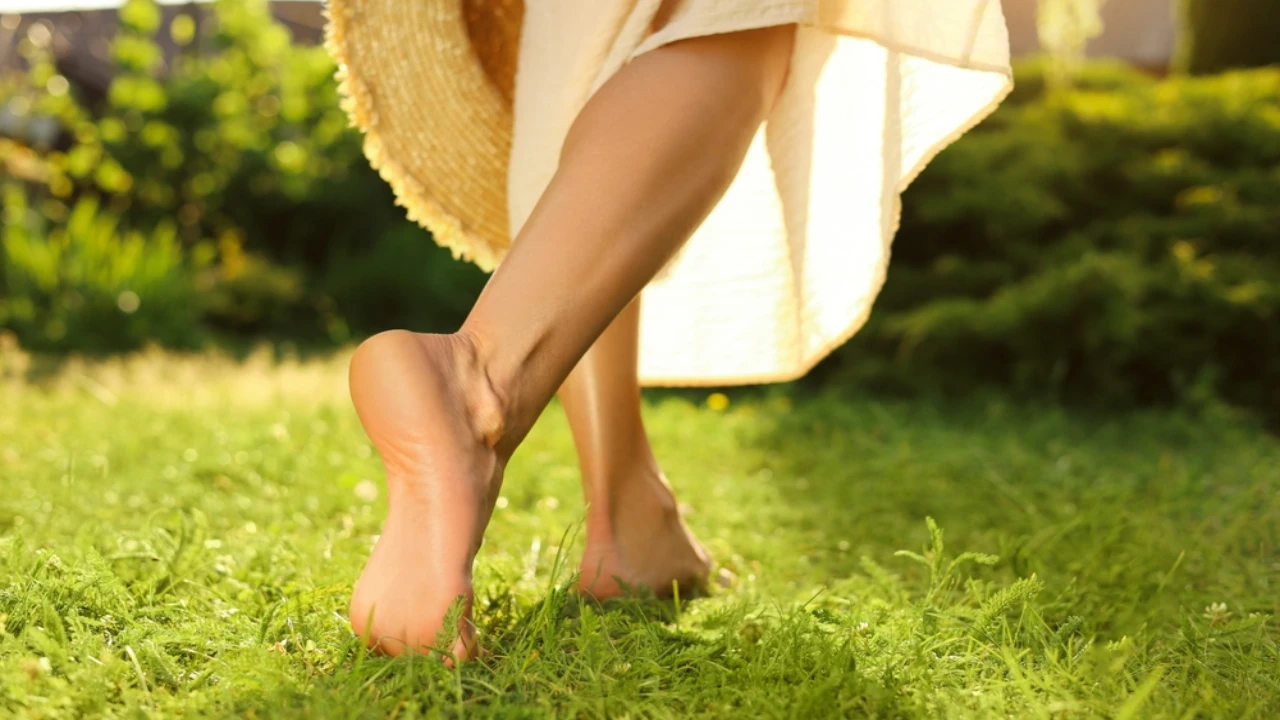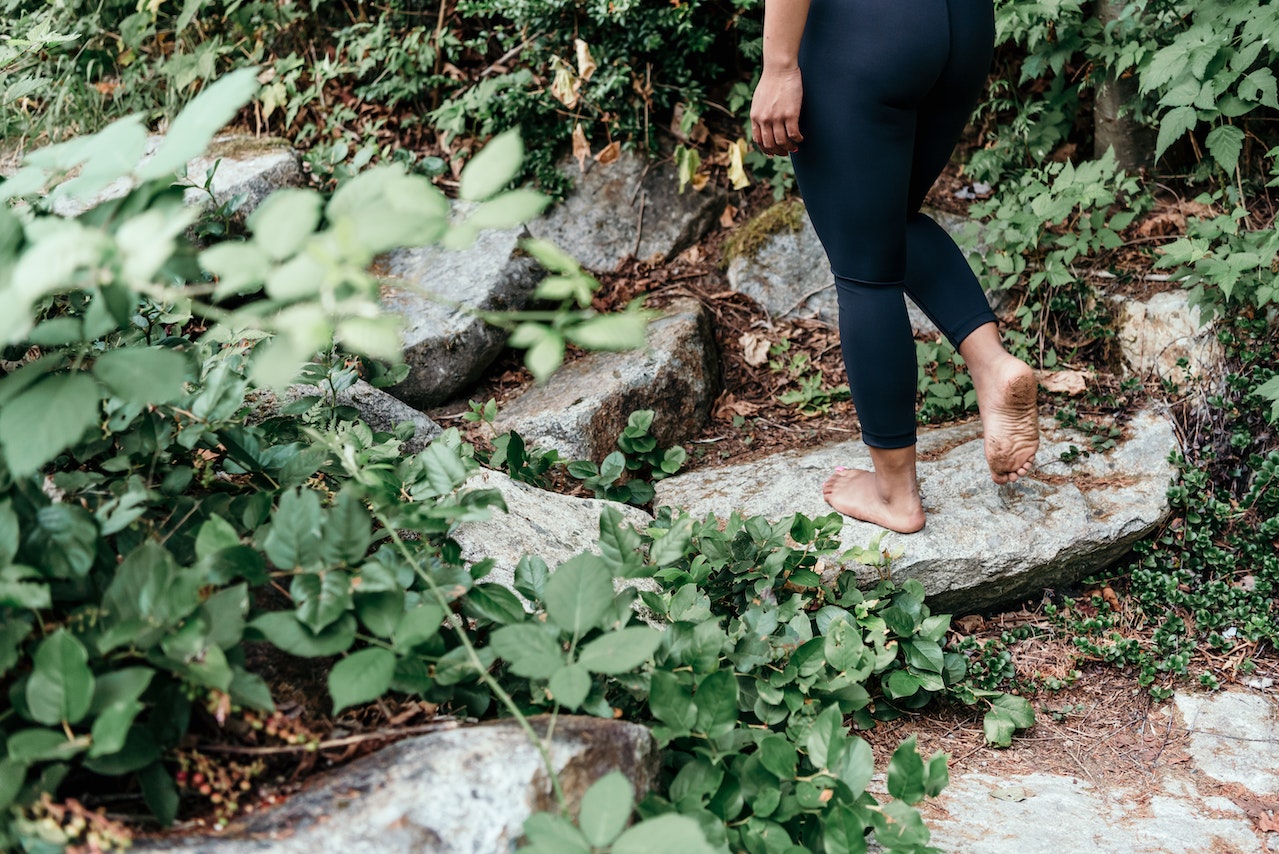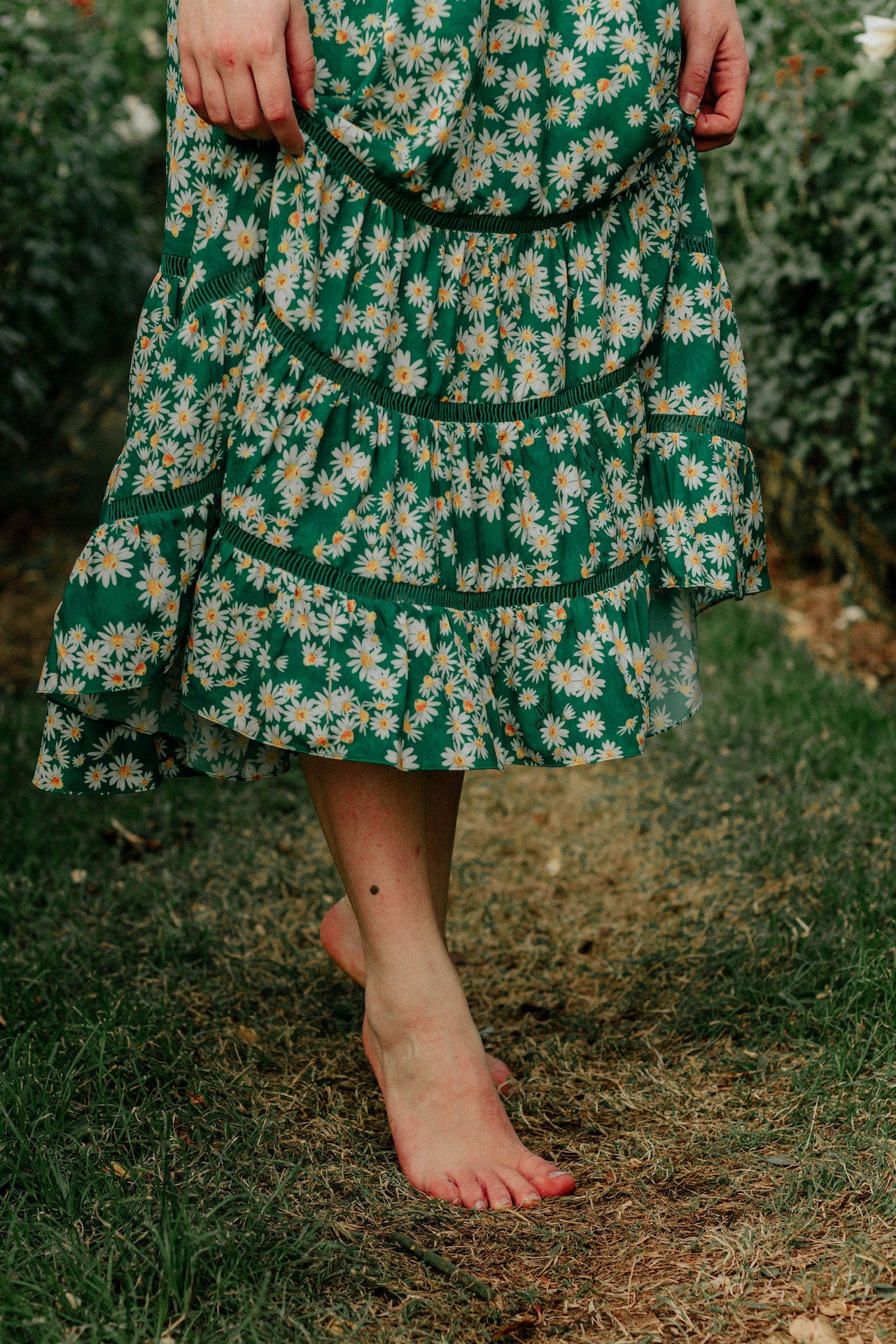10 Health Benefits of Walking Barefoot That You Need to Know
From treating anxiety to reducing inflammation — the benefits of walking barefoot may work wonders for your health. In this article, find all you need to know.

You may have grown up to be reluctant towards walking barefoot on the ground or grass as it might make your feet dirty or contaminate them with germs. While the concern may be right, the multiple benefits of walking barefoot might be helpful for your body and overall health. According to research, barefoot walking is a practice through which bodily contact with Earth’s natural electric charge might stabilize your physiology at the deepest levels. Also known as ‘earthing’ or ‘grounding’, it may have systematic, profound, and foundational effects on your body which might promote greater well-being. Studies further suggest that this earth’s cure may help in restoring the lost and much-needed electric connection with the planet (1), (2).
But how is walking barefoot good for you? From the associated risks, and safety measures, to the ultimate benefits of walking barefoot — find everything you ought to know about this beneficial practice below.
What Are the Health Benefits of Walking Barefoot?

According to research, having direct contact with Earth’s surface may generate a type of electric nutrition. This may have rapid and potent antioxidant and anti-inflammatory effects on your body. The study also states that barefooting might have the potential to be a natural, simple, and effective clinical strategy to fight against degenerative, non-communicable, and inflammatory-related problems (3). Ahead, we have put together a list of the top 10 benefits of walking barefoot that may have a positive impact on your overall health.
1. May Strengthen Your Feet
Barefooting may help in strengthening your feet and making them stronger. Anecdotal evidence suggests that walking barefoot can stretch the small muscles, tendons, and ligaments in your legs. Hence, this might help in fighting the atrophy of the leg muscles. Grounding may also help in preventing injuries and inflammation on your leg, hence ensuring that your feet are healthy and strong (2).
2. May Reduce Oxidative Stress in Your Body
One of the most effective and best benefits of walking barefoot is that it may help in lowering the oxidative stress in your body. This happens when electrons from the planet’s surface naturally flow into your body during the process of earthing or grounding. These free electrons might have antioxidant effects on your body and may also slow down the efficacy of reactive oxygen species (ROS). Hence, walking barefoot may reduce oxidative stress (2).
3. May Promote Good Cardiovascular Health
Barefoot grounding might lead to direct contact of the human body with the surface of the Earth which may have multiple intriguing effects on your physiology. It may also have a positive impact on cardiovascular risk factors in your body. Research suggests that going barefoot might increase the surface charge on your red blood cells. This may help in reducing blood viscosity, clumping, and also hypertension (4). Hence, grounding or earthing may be beneficial in reducing cardiovascular events and risks.
4. May Help Fight Inflammation
According to studies, walking barefoot may lead to the production of measurable differences in the concentrations of cytokines, white blood cells, and other chemical compounds which are involved in the process of an inflammatory response. Further, when the skin comes in direct contact with the surface of the Earth, it enables the movement of free electrons from the planet’s surface into the body. When these free electrons enter and spread into the body, they may build an antioxidant microenvironment around the injury repair fields. This might also neutralize the free radicals and eventually help in effectively combating the problems of inflammation (2), (5).
5. May Boost Immunity
One of the biggest benefits of walking barefoot is that it might help boost your immunity. When free electrons move from the Earth’s surface into your body through acupuncture points and mucous membranes, the body absorbs and donates these electrons to the areas which need immune support (2). Additionally, research also states that when there is a disconnect between the Earth’s surface and your body, it might cause a rise of inflammatory-related diseases that may weaken your immune system. This may happen due to the lack of sufficient electrons in the body which might weaken the mitochondria (responsible for energy production) and gradually lead to fatigue (6).
6. May Help in Healing Chronic Pain
According to research, earthing barefoot may have positive effects on your physiology and also help alleviate pain. Walking barefoot may alter the number of circulating lymphocytes and neutrophils in your body which might help reduce pain. Further, grounding or earthing may also cause rapid resolution of painful chronic inflammation and prevent its symptoms such as swelling, redness, pain, heat, and more (2), (7).
7. May Provide Relief From Anxiety
Walking barefoot benefits your mental health by providing relief from anxiety. According to one study, just one hour’s worth of direct contact with the Earth’s surface might improve your mood (8). Also, when free radicals move from the Earth’s surface into your body and are absorbed by you, they may help reduce stress vulnerability (9). Anecdotal evidence also states that grounding can be related to lower anxiety levels.
8. May Help in Promoting Good Eyesight
One of the benefits of going barefoot is that direct contact with the Earth's surface might improve your vision. Research states that the reflex (acupuncture) points on your foot are connected to the optic nerves directly which may eventually help in promoting good eyesight. Further, as you keep earthing, these specific points in your toes may get activated and carry out the physiological function of improving vision (10).
9. May Encourage Better Sleep
When free electrons enter your body while walking barefoot, it may have multiple positive physiological benefits for your body. These electrons may have antioxidant effects and normalize daily cortisol rhythm. According to research, positive changes in cortisol levels may reflect a healthier circadian rhythm of the HPA axis in your body, which is associated with better sleep. Hence, grounding promotes improved sleep. (2), (11), (12), (13).
10. May Help Regulate the Nervous System
When your body comes in direct contact with the Earth’s surface, the phenomenon of electron exchange puts your body into a healing state. Research states that when free electrons move from the planet’s surface into your body, it may enhance your conductive health (the transmission of electrons within your muscles, nerves, and other tissues). This may have positive implications on the cardiovascular system, central and peripheral nervous system, and musculoskeletal system (2), (14). Another study also states that earthing may significantly influence the electrical activity of your brain (15).
What Are the Risks Associated with Walking Barefoot?

If you have walked in shoes throughout your life or have just started walking barefoot, then the process may come with certain risks. Hence, before you decide to reap the benefits of walking barefoot, it is imperative to understand its limitations. Here are some associated risks which you may keep in mind:
May Cause Diabetic Foot Disease
While barefoot grounding has its share of benefits, it may also cause injuries and other problems. According to research conducted in developing countries, walking with bare feet may be a major risk factor for the occurrence of diabetic foot disease. Studies indicate that there might be a link between grounding and diabetic foot ulcers (16).
Might Lead to Fungal Infections
When walking barefoot, it is important to ensure that you stay away from areas that may have growth of fungus. In case of direct contact of your feet with such areas, the fungi might cause fungal infections in your feet and within your body too. Hence, you may want to avoid walking barefoot in places such as swimming pools, locker rooms, gyms, or beaches (17), (18).
May Result in Hookworm Infection
Before you decide to try barefooting, it is crucial to consider the surface that you might be walking on. Studies further suggest that hookworm larvae (immature worms), which may be present in the soil, might have the ability to enter your body through the skin of your legs. The research also states that hookworms thrive in soil; hence walking barefoot on contaminated soil may lead to hookworm infection (19), (20).
How to Walk Barefoot Safely?

While there are multiple benefits of walking barefoot on Earth, it is important to do it safely. Here are some points and safety tips that you may keep in mind before you walk barefoot:
Remember to Start Slow
It is important to give time to your feet to get adapted and accustomed to different surfaces. You may try walking in distinct environments every day for about 10 minutes. This practice might help in making your feet, legs, and ankles prepared for barefooting.
Take Breaks When it Feels Uncomfortable
Walking barefoot is supposed to be a pleasant, sensory experience. In case of discomfort or pain while grounding, remember that it is okay to stop and take a break until you feel better. Make sure that you do not make this a chore.
Practice Indoors
Before you step out for earthing, you may practice going barefoot inside your house. This might help you get into the rhythm and habit.
Try Foot-balancing Exercises
You may try exercises like flexing, stretching, or touching your feet at home. This might help in preparing and strengthening your feet before you walk barefoot outside.
Conclusion
Walking barefoot, also known as ‘earthing’ or ‘grounding’ may benefit your body and overall health in multiple ways. This practice connects your body directly with the Earth’s surface which might help in making you more mindful and also have a positive impact on your physiology.
The benefits of walking barefoot include better sleep, reduction in inflammation and pain, relief of anxiety, boost immunity, and more. However, before you decide to reap these benefits naturally, it is important to understand the risks which may be associated with going barefoot. It might lead to fungal infections, hookworm infections, diabetic foot disease, and more. Hence, it is imperative to walk barefoot safely.
Sources:
1. Integrative and lifestyle medicine strategies should include Earthing (grounding): Review of research evidence and clinical observations
https://pubmed.ncbi.nlm.nih.gov/31831261/
2. The effects of grounding (earthing) on inflammation, the immune response, wound healing, and prevention and treatment of chronic inflammatory and autoimmune diseases
https://www.ncbi.nlm.nih.gov/pmc/articles/PMC4378297/
3. Electric Nutrition: The Surprising Health and Healing Benefits of Biological Grounding (Earthing)
https://pubmed.ncbi.nlm.nih.gov/28987038/
4. Earthing (Grounding) the Human Body Reduces Blood Viscosity—a Major Factor in Cardiovascular Disease
https://www.ncbi.nlm.nih.gov/pmc/articles/PMC3576907/
5. Earthing: Health Implications of Reconnecting the Human Body to the Earth's Surface Electrons
https://www.ncbi.nlm.nih.gov/pmc/articles/PMC3265077/
6. Grounding – The universal anti-inflammatory remedy
https://www.ncbi.nlm.nih.gov/pmc/articles/PMC10105021/
7. Pathology, Inflammation
8. The effect of grounding the human body on mood
https://pubmed.ncbi.nlm.nih.gov/25748085/
9. The Effect of Earthing Mat on Stress-Induced Anxiety-like Behavior and Neuroendocrine Changes in the Rat
https://www.ncbi.nlm.nih.gov/pmc/articles/PMC9855809/
10. Revisiting reflexology: Concept, evidence, current practice, and practitioner training
https://www.ncbi.nlm.nih.gov/pmc/articles/PMC4624523/
11. Earthing: health implications of reconnecting the human body to the Earth's surface electrons
https://pubmed.ncbi.nlm.nih.gov/22291721/
12. Perspective: assume a spherical cow: the role of free or mobile electrons in bodywork, energetic and movement therapies
https://pubmed.ncbi.nlm.nih.gov/19083655/
13. Relationship between Cortisol Changes during the Night and Subjective and Objective Sleep Quality in Healthy Older People
https://www.ncbi.nlm.nih.gov/pmc/articles/PMC7068538/
14. Practical applications of grounding to support health
https://pubmed.ncbi.nlm.nih.gov/36481428/
15. The neuromodulative role of earthing
https://pubmed.ncbi.nlm.nih.gov/21856083/
16. Is walking barefoot a risk factor for diabetic foot disease in developing countries?
https://pubmed.ncbi.nlm.nih.gov/17571928/
17. Fungal infections in humans: the silent crisis
https://www.ncbi.nlm.nih.gov/pmc/articles/PMC7278517/
18. Preventing and treating fungal infections
https://vitalrecord.tamhsc.edu/preventing-and-treating-fungal-infections/
19. Hookworm
20. Parasites - Hookworm
https://www.cdc.gov/parasites/hookworm/index.html
21. Plantar Fasciitis





 JOIN OUR WHATSAPP CHANNEL
JOIN OUR WHATSAPP CHANNEL






















































